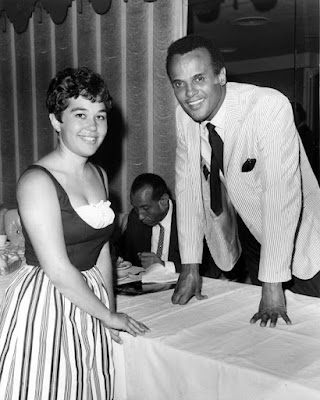My mother considered herself the #1 fan of singer/actor/activist Harry Belafonte, who has just died at the age of 96. All of her adult life she adored Belafonte’s singing, his acting, his political stances, and his dusky good looks. And, of course, she passed on this passion to her children.
There was a time when Belafonte regularly brought his electrifying stage show, complete with backup singers and dancers, to L.A.’s outdoor Greek Theatre. When the dates were announced, my mother would quickly order two sets of tickets. On one night she’d attend with my father. On another, she’d bring my young sister and me to see the great man in person. I mean this literally—one year she figured out where the entertainers parked their cars, and stationed the three of us where we’d be sure to meet her hero. It worked. Belafonte emerged, and graciously greeted the dressed-up little girls. (He had some of his own at home, so he knew how to talk to kids.) When he complimented me on my pretty dress, I proudly explained that my mother had bought it on sale. It became a family story that was told many times over. Years later, he was equally ingratiating when I (then a young journalist) met him at a record industry luncheon. Someone snapped a photo, which you can see below. It became a prominent feature of my mother’s kitchen bulletin board.
Belafonte studied acting before he became known as a singer of calypso tunes. One of his earliest films, Carmen Jones (1954), was a musical in which he didn’t get to sing a note. This all-Black version of Bizet’s Carmen, adapted from a hit Broadway show, required operatic warbling, and both he and star Dorothy Dandridge were dubbed. Later in the decade, he starred in screen dramas that always had a racial element at their core. A Caribbean-set political and romantic drama, Island in the Sun, allowed him to bare his torso on-screen and to romance—with serious consequences—the very blonde Joan Fontaine.
The Belafonte film from the 1950s that I remember best is an imaginative apocalyptic story called The World, the Flesh, and the Devil (1959). It’s set in Manhattan, in the aftermath of some sort of nuclear disaster that has rid the city of virtually all its inhabitants. The only survivors in this New York ghost town seem to be Belafonte (a mine inspector who was deep underground at the time of the blast), a pretty young Caucasian woman played by Inger Stevens, and a crusty older sailor (Mel Ferrer). What we’ve got here, as the survival of the human race seems in question, is a potential love triangle with strong racial overtones. The film was the first offering of Belafonte’s own production company, dedicated to portraying the African-American experience on-screen.
In later years, as he began
to emphasize social activism over acting, Belafonte took on fewer film roles,
though he did appear in movies directed by his close friend, Sidney Poitier.
These included 1972’s Buck and the Preacher and the 1974 comedy Uptown
Saturday Night, in which his crime-boss character, Geechy Dan, is a wicked
send-up of Marlon Brando’s Vito Corleone. As he aged, he continued to take on occasional
roles in films that had personal meaning to him, like Bobby, about
events surrounding the assassination of Robert Kennedy. His last film appearance was a powerful one,
in Spike Lee’s BlacKKKlansmen (2018) He was over ninety when he played
for Lee a civil rights activist describing in horrific detail a Klan lynching. May he rest in peace.



You forgot to mention how sometimes your photo would get covered on the bulletin board - but never Harry Belafonte!
ReplyDeleteAnonymous, I suspect I know who you are. It's true -- when it came to photos, my mother preferred Harry Belafonte to me!
Delete